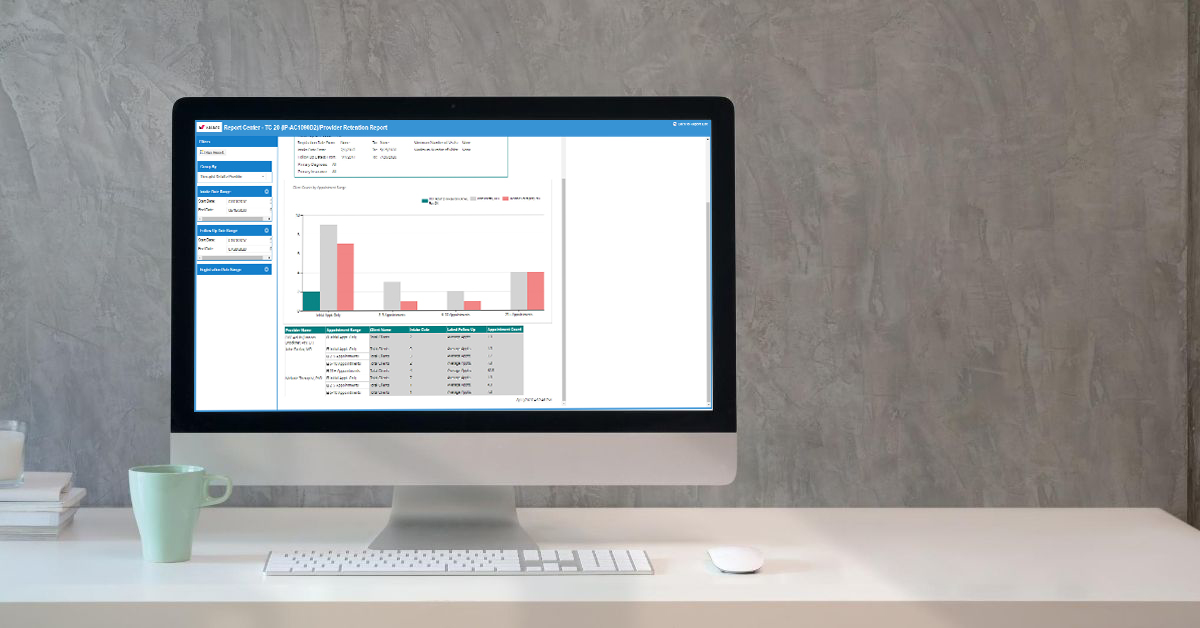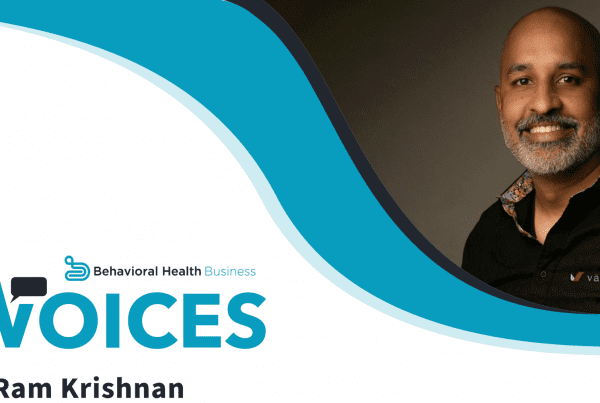An electronic health record (EHR) is a centralized digital collection of patient data that has completely replaced paper records in most behavioral health practices. Typical information included in a patient EHR includes medical history, current and past medications, allergy alerts, demographic data, laboratory results, and therapy progress notes. If your practice does not currently use EHR software, investing in it now could be one of the most important things you do to increase efficiency and reduce costs.
What are the Benefits of EHR Software?
As with any type of data stored electronically, the most obvious benefit of implementing EHR software in your behavioral health practice is the immediate reduction in paperwork and the associated increase in productivity that comes with it. Not only can you feel good about contributing less waste to the environment and decluttering your office, but you will also see a large decrease in the amount of administrative work required to keep your practice running .
Here are some other important benefits to consider:
- Improved efficiency: As mentioned above, having all patient and billing data available in a single location that can be accessed from anywhere can eliminate hours of administrative tasks every week. This frees your staff to focus on what’s most important, which is serving the needs of your behavioral health patients.
- Better patient outcomes: If you are able to track and trend your patients’ progress over time, you can understand the effectiveness of your treatments and adjust your approach to best serve their needs. With the right EHR software, this data can be tracked systematically, with little additional effort from the provider or administrative team.
- Higher reimbursement rates: Some EHR softwares have the reporting capabilities to show that your treatments are effective at an aggregate level. When you are able to provide objective outcomes data for your practice, you can negotiate better reimbursement rates from your payors.
- Better client experience: Client confidence in a behavioral health practice often improves when they know that only authorized employees can view their private health information (PHI) in an electronic format. EHR software also makes it easier for your staff to schedule appointments and send medication reminders. Some EHR software platforms also include a patient portal, which gives clients the ability to schedule appointments, review bills, complete intake paperwork, and session questionnaires, and pay bills online, without a dependency on your office staff.
- Improved information sharing: Forget about calling or emailing other providers your client has seen when you can communicate much faster via EHR software. Facilitating communication between professionals is especially important in behavioral health because it promotes the continuity of care necessary for patients to recover.
- Improved transparency: Transparency equals trust, especially in a behavioral health environment. EHR software allows for transparency of medical information as well as a seamless way to bring all departments together to serve patients in a uniform manner.
- Reduced liability for your practice: Preparing for an audit or litigation can be incredibly stressful and time-consuming, especially when documentation lives in multiple places. EHR software helps reduce the liability to your practice by ensuring documentation is all in one place, in a consistent format, and easily accessible by the people that need it.
- Improved billing efficiency: EHR software that has integrated billing capabilities makes it possible to store patient billing and insurance information along with their medical data, creating a more streamlined and effective billing process. After submitting a claim to insurance, patients can be billed directly for the remaining balance directly from the EHR software.
- Ability to see clients remotely: With the right EHR software, your practice can see clients in-person or remotely using the same workflows regardless of modality. HIPAA-compliant video-conferencing, electronic signature capabilities, and online bill pay are all features that ensure practices can operate efficiently regardless of your business model.
These are just a handful of the benefits you can expect with Valant EHR software. At Valant, we pride ourselves on offering comprehensive, yet intuitive EHR software exclusively for behavioral health practices of all sizes.
Key Features of EHR Software
At Valant, we know that your staff doesn’t have time to work from several software programs. Your organization can save significant time and money by having everything your staff needs in a single location. Our key features include:
- Developed exclusively for Behavioral Health: Eliminate the unnecessary clutter that comes with using a generic EHR for your very specialized work. Our library of built-in outcome measures, mental-health-specific data fields, and a user interface that matches this industry’s workflows all contribute to a more efficient practice and better patient care.
- Billing and invoicing: With full billing integration in your EHR software, you can reduce the amount of time spent on billing and have higher success collecting payment for mental health visits. We give you the opportunity to use our clearinghouse or to sync with your own vendor for claims processing. Our automated charge creation feature can help ensure you get paid at the highest rates. And our robust reporting capabilities will allow you to understand what has been paid and what might require additional attention.
- Client intake: Improve client intake workflow by using Valant’s EHR software to electronically send intake documents to patients and check them in when they arrive for appointments. Client symptoms and history questionnaires will automatically populate into the patient record, saving valuable time, and reducing the potential for error.
- Online patient portal: Reduce routine calls to your practice by providing patients with an online portal. They can view/confirm/reschedule appointments, complete intake paperwork, access telehealth appointments, and update insurance information, demographics, and other personal data. Valant’s software is unique in that clients can also use the portal to fill out assigned behavioral health assessments, which are then scored and automatically populated in their chart for tracking progress over time.
- Plans, notes, and charts: Choose what level of automation you would like for note-taking. Access ready-made templates, which range from completely unstructured/free-text (providers can write text or dictate directly into the note) to a selection of structured notes built for different treatment modalities and clinical interventions. Notes from previous sessions can be carried forward, giving you the flexibility to change just the pertinent information from that session.
- Scheduling: Allows your staff to schedule and manage appointments seamlessly with day, week, or month calendar views.
You can see these features in action during your free demo. Please don’t hesitate to ask questions about any of these key features if you need additional clarification.
EHR Software is Ideal for Virtual Work
Psychiatry has adapted well to conducting telehealth sessions through secure, online videoconferencing. While not all clients desire this model, many appreciate the convenience of holding a session from anywhere. Valant’s EHR software perfectly complements a virtual work environment, whether it’s a psychiatrist, therapist, or member of your office staff accessing it. The software makes it possible for all staff to remain connected regardless if they work in the office or from home.
How Does EHR Software Improve the Efficiency of Behavioral Health Practices?
EHR software allows you to significantly streamline administrative work and free up clinician time, allowing more time to be spent on clients. With patient information such as appointment times, progress notes, and claims linked, you have all the information you need right at your fingertips. Using an EHR makes it simple to share information with other providers, something especially critical in the behavioral health field.
Continue reading What is EHR Software…
What Information is Stored in EHR Software?
A behavioral health EHR stores information such as the patient’s name and contact information, intake data, medical history, symptom questionnaires, progress notes, and prescription data. Behavioral health practitioners can customize their EHR to store the data they need, protecting the privacy of their patients and reducing time spent sifting through records.
What’s the Difference Between an EHR & EMR?
An electronic medical record (EMR) is a much more basic system than an EHR. An EMR is an electronic version of a clinician’s paperwork containing treatment and medical history. You cannot easily share patient information with other providers because EMRs do not include that feature. You must print records on paper and send them by mail or fax. The EHR interface is better connected and easier to use. Here are some questions to ask all EHR vendors before finalizing your purchase:
- Does the software require a public or private cloud?
- Is the EHR deployed by cloud-native, client-server, or web-hosting? Does the software serve your unique needs as a behavioral health practice or is it generalized to primary care and other physical-medicine specialties?
- Is the quoted price all-inclusive or must you pay for extra features?
- What is involved with workflows, forms, and data captures?
- What type of training and ongoing support does the EHR software company provide?
- What does the implementation process look like?
- Will the EHR software grow with your practice?
- Will the EHR software give you the business analytics needed to understand what is driving growth or detracting from your profits?
All EHR software vendors should be able to answer these questions as well as provide a free demonstration and price quote.
What Hardware Do You Need for an EHR?
The only hardware required to get started with an EHR is a functioning computer with access to the internet — your laptop will suffice! EHRs are cloud-based systems that store information on off-site servers, so a reliable internet connection is necessary.
Additionally, we recommend the following hardware to ensure system security and an easy transition from traditional paper records:
- Document imaging device or scanner
- Electronic document management system
- Storage and backup devices
- Printer
We understand this is a lot of information to consider and are here to help. The entire team at Valant looks forward to helping your behavioral health practice become more efficient and profitable. If you have any questions or would like to see a demo, click here.
What is EHR Software Recap
What is EHR Software?
An electronic health record (EHR) is a centralized digital collection of patient data, replacing paper records. It includes medical history, medications, allergy alerts, demographic data, lab results, and therapy notes. Investing in EHR software enhances efficiency and reduces costs.
What are the Benefits of EHR Software?
EHR software reduces paperwork, increases productivity, improves patient outcomes, enhances reimbursement rates, and provides better client experience. It also improves information sharing, transparency, reduces liability, and boosts billing efficiency. EHRs enable remote client sessions with features like HIPAA-compliant video conferencing and online bill pay.
What Information is Stored in EHR Software?
EHRs store patient names, contact information, intake data, medical history, symptom questionnaires, progress notes, and prescription data. They can be customized to meet specific needs, ensuring privacy and reducing the time spent on record-keeping.
What’s the Difference Between an EHR & EMR?
An EMR is a digital version of a clinician’s paperwork and is less comprehensive than an EHR. EMRs don’t easily share information with other providers, requiring paper records to be mailed or faxed. EHRs offer better connectivity and ease of use.
What Hardware Do You Need for an EHR?
You need a computer with internet access to start using an EHR. Additional recommended hardware includes a document scanner, electronic document management system, storage devices, and a printer for system security and an easy transition from paper records.
How Does EHR Software Improve the Efficiency of Behavioral Health Practices?
EHR software streamlines administrative tasks and frees up clinician time for clients. It links patient information like appointments, progress notes, and claims, making it easy to share with other providers and improving overall efficiency.





